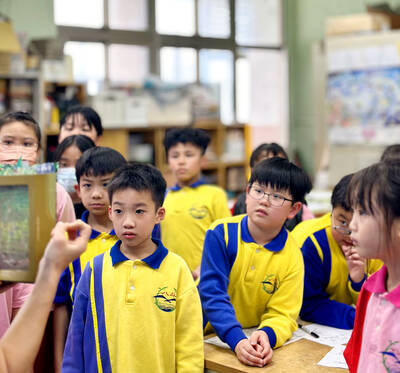It’s not easy for students from schools outside Taipei, where the majority of the country’s more than 150 colleges are located, to see films that are not made in Hollywood. They may need to trek to the capital to catch a film festival or independent movie deemed unworthy for release outside the capital, where the number of art-house moviegoers is said to be prohibitively small.
Seven years ago, Lin Wen-chi (林文淇), a professor of film at National Central University (國立中央大學) in Jhongli (中壢), and Chen Te-ling (陳德齡), a then-recent graduate from the university’s Department of English, built a movie theater on the university’s campus that provides students access to non-Hollywood flicks.
The pair wanted to build on the campus cinema’s success.
In 2008, the university’s Film Studies Center (電影文化研究室),
led by Lin, and Cinema Taiwan Film (中映電影), where Chen
serves as the CEO, together initiated the first College Film Festival (大學生影展), which tours the country’s campuses screening independent movies.
More than 35 institutes of higher education signed up for the festival, whose year-round program screens films about subjects ranging from human rights and media ethics to gender and ethnic issues.
This year’s edition, which comprises 11 movies from seven countries, grouped under four themes, was expanded to include two new sections: world cinema and locally produced films.
The lineup includes Waltz With Bashir, a stunning animation that revisits the 1982 Lebanon War; A Map for Saturday, which follows a backpacker’s trek across four continents through 26 countries; and When You Come Down From Heaven, a tale about a man whose job entails removing vagrants
from a French city during the Christmas holidays.
The festival will screen 10 Taiwanese films later this year.
Organizers make the event as flexible and inclusive as possible to accommodate different tastes and academic interests.
“For example, Taiwanese movies draw more interest from Taiwanese literature student clubs and departments of Chinese literature,” Chen said. “We were surprised at the diversity of these groups and their interest in wanting to work with us. These range from the schools’ libraries, general education departments or extracurricular centers.”
Chen initially thought film clubs would be the most interested, he said, but many have closed down because of the widespread availability of mainstream movies on the Internet.
“Cinema is a good way of understanding our world. We hope students can appreciate all these different movies and develop a habit of watching them,” Chen said.
All the festival’s screenings
are free.
Colleges and universities interested in hosting the festival can contact Ms Chiang (江) at Cinema Taiwan Film, a company that founded online film magazine Fun Screen (放映週報) in 2005 and whose services include organizing film festivals and workshops
for schools, private companies and government institutions, at (02) 2776-0542.
For more information about the festival, visit film.ncu.edu.tw/college.

May 26 to June 1 When the Qing Dynasty first took control over many parts of Taiwan in 1684, it roughly continued the Kingdom of Tungning’s administrative borders (see below), setting up one prefecture and three counties. The actual area of control covered today’s Chiayi, Tainan and Kaohsiung. The administrative center was in Taiwan Prefecture, in today’s Tainan. But as Han settlement expanded and due to rebellions and other international incidents, the administrative units became more complex. By the time Taiwan became a province of the Qing in 1887, there were three prefectures, eleven counties, three subprefectures and one directly-administered prefecture, with

It’s an enormous dome of colorful glass, something between the Sistine Chapel and a Marc Chagall fresco. And yet, it’s just a subway station. Formosa Boulevard is the heart of Kaohsiung’s mass transit system. In metro terms, it’s modest: the only transfer station in a network with just two lines. But it’s a landmark nonetheless: a civic space that serves as much more than a point of transit. On a hot Sunday, the corridors and vast halls are filled with a market selling everything from second-hand clothes to toys and house decorations. It’s just one of the many events the station hosts,

Through art and storytelling, La Benida Hui empowers children to become environmental heroes, using everything from SpongeBob to microorganisms to reimagine their relationship with nature. “I tell the students that they have superpowers. It needs to be emphasized that their choices can make a difference,” says Hui, an environmental artist and education specialist. For her second year as Badou Elementary’s artist in residence, Hui leads creative lessons on environmental protection, where students reflect on their relationship with nature and transform beach waste into artworks. Standing in lush green hills overlooking the ocean with land extending into the intertidal zone, the school in Keelung

Taiwan Power Co (Taipower, 台電) and the New Taipei City Government in May last year agreed to allow the activation of a spent fuel storage facility for the Jinshan Nuclear Power Plant in Shihmen District (石門). The deal ended eleven years of legal wrangling. According to the Taipower announcement, the city government engaged in repeated delays, failing to approve water and soil conservation plans. Taipower said at the time that plans for another dry storage facility for the Guosheng Nuclear Power Plant in New Taipei City’s Wanli District (萬里) remained stuck in legal limbo. Later that year an agreement was reached